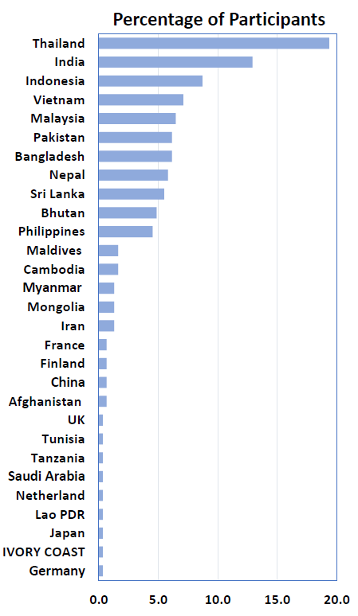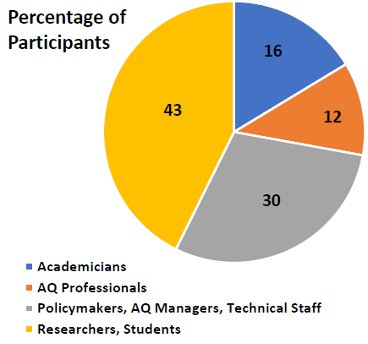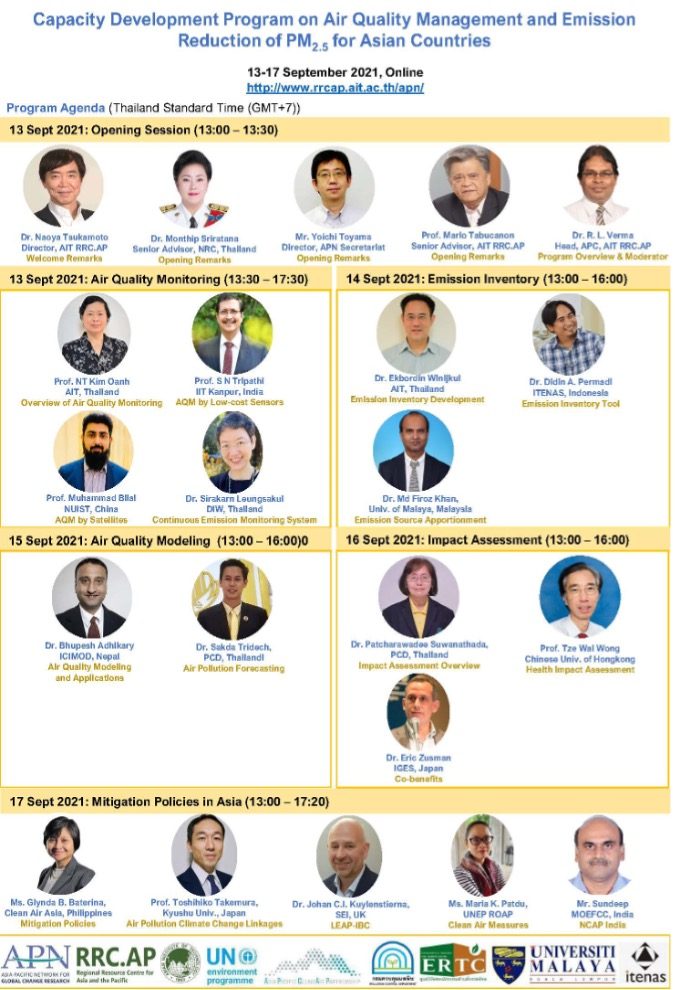By Dr. R. L. Verma
September 17, 2021 -- The Asian Institute of Technology’s Regional Resource Centre for Asia and the Pacific (RRC.AP) organized a virtual training workshop on “Capacity Development Program on Air Quality Management and Emission Reduction of PM2.5 for Asian Countries” from 13-17 September 2021. The workshop was attended by policymakers, air quality managers, technical staff working with pollution control agencies, and air quality professionals from various sectors to enhance their capacities for better management of air quality in Asian countries.

Participants of the virtual workshop held on September 13 – 17, 201
More than 200 participants from 29 Asian countries and other parts of the world.  Participants included academicians, young researchers, and students, and intergovernmental networks which are essential mechanisms for air quality control in the region, namely, the ASEAN Agreement on Transboundary Haze Pollution, Acid Deposition Monitoring Network in East Asia (EANET), Malé Declaration on Control and Prevention of Air Pollution and its Likely Transboundary Effects for South Asia (Malé Declaration), Asia-Pacific Clean Air Partnership (APCAP), and the Asia-Pacific Network for Global Change Research (APN).
Participants included academicians, young researchers, and students, and intergovernmental networks which are essential mechanisms for air quality control in the region, namely, the ASEAN Agreement on Transboundary Haze Pollution, Acid Deposition Monitoring Network in East Asia (EANET), Malé Declaration on Control and Prevention of Air Pollution and its Likely Transboundary Effects for South Asia (Malé Declaration), Asia-Pacific Clean Air Partnership (APCAP), and the Asia-Pacific Network for Global Change Research (APN).
The training consisted of five modules: 1) Air Quality Monitoring, covering ground-based air quality monitoring, air quality monitoring using low-cost sensors, air quality monitoring using satellite remote sensing, and air quality monitoring by continuous emission monitoring system (CEMS); 2) Emission Inventory Development, covering emission inventory development of air pollutants, demonstration of Emission Inventory Tools, and source apportionment of air pollutants using models, 3) Air Quality Modeling, covering air quality modeling by using chemical transport models including forecasting of air pollutants, 4) Impact Assessment, covering impact assessment of air pollution on human health and the environment including models and tools used for the impact assessment, and 5) Air Pollution Mitigation Policies, covering air pollution mitigation policies and measures being implemented by the Asian countries at national levels including models and tools used for policy planning and co-benefits.
Globally renown experts from India, Japan, Thailand, Indonesia, China, Malaysia, Nepal, the Philippines, and the UK gave the total of 18 lectures during the five-day training, covering various aspects of the five modules on air quality management including emission reduction of PM2.5.
 Young researchers and students were the majority of participants throughout the workshop, followed by policymakers, air quality managers, technical staff who deals with air quality management in the countries, academicians, and air quality professionals working with private sectors, international organizations, UN organizations, NGOs and others.
Young researchers and students were the majority of participants throughout the workshop, followed by policymakers, air quality managers, technical staff who deals with air quality management in the countries, academicians, and air quality professionals working with private sectors, international organizations, UN organizations, NGOs and others.
Participants are awarded with an electronic certificate of participation (e-certificate) after submitting evaluation forms. The evaluation results showed that the participants were satisfied with the contents as they had learned a lot from the workshop.
The workshop was the first capacity building workshop to be organized as a part of the two-year project on “Capacity Development Program on Air Quality Management and Emission Reduction of PM2.5 for ASEAN Countries” supported by Asia-Pacific Network for Global Change Research (APN). APN funded the project as part of their Capacity Development Programme (CAPaBLE) and it is in line with APN’s thematic priority areas on transboundary air pollution and its impact on human health.
Apart from APN and AIT, the Pollution Control Department (PCD), Thailand; the Environmental Research and Training Center (ERTC), Ministry of Natural Resources and Environment, Thailand; the National Institute of Technology (ITENAS), Indonesia; the University of Malaya (UM), Malaysia; and the UNEP Regional Office for Asia and the Pacific (UNEP/ROAP) are the partner to this project.
For more information can be found at http://www.rrcap.ait.ac.th/apn/


